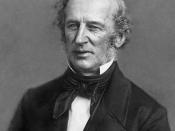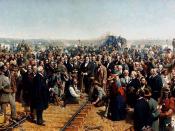Railroad Monopolies
A monopoly is when one person or group has exclusive control over something. A modern day example of a monopoly is Microsoft. Microsoft completely dominated the computer market by using their dominance and billions of dollars from the personal operating systems and business applications to develop products for multimedia, business operating systems, and now even games and on-line services. People in the late in 1800s dominated and abused other things, such as railroads. Railroad companies could charge a farmer very high just to transport their crops a short distance and the farmers could not do anything about it. The railroad monopolies of the 1800s were very hazardous and nearly controlled the way every westerner performed their business and lived their lives.
Colonel John Stevens was the man who came up with the idea of constructing a railroad. He wrote all of his ideas on the railroad in a journal titled "Documents tending to prove the superior advantages of railways and steam carriages over canal navigation."
Some of the first railroads were not automatically ran on trains, but with horse pulling carts along tracks. The first railroad was constructed in 1826 which only covered a span of about three miles. On Christmas Day, 1830, the South Carolina Canal and Railroad Company completed the first mechanical passenger train. This day marked the beginning of the modern railroad industry. This industry would run every westerner's life for many decades to come. (Small)
Within twenty years of the first mechanical passenger train, over 9000 miles of track had been laid down across the United States. Although this may seem like a lot, not one track spanned more than a few miles. Soon various railroad companies started to cooperate with one another to maximize their overall profits. These few companies that were cooperating...


